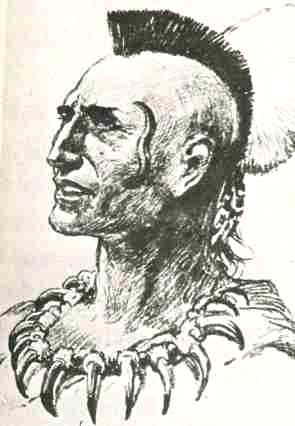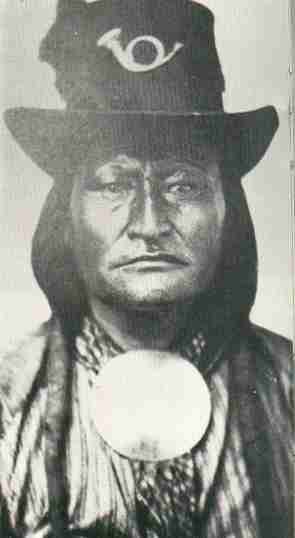The Native Americans.
Work Group 3
Vincenzo Vallefuoco, Domenico Ciccarelli, Giuliano Cuccurullo, Raffaella Amoruso, Giovanni Padrevita, Vincenzo Chianese
The Plains Indians -the Tribes
The Plains Indians travelled
during the Ice Age from Asia to Alaska, settled in the area from the
Mississippi River to the Rocky Mountains.
The Great Plains were
incredibly hot in summer and very cold in winter with snow and when it rained,
it flooded. The most important tribes were : Cheyenne , Comanche, Plains
Apache and Sioux ( call also “Dakota or Lacota”). They became
fully nomadic to follow the buffalo.
They lived in
the teepees, made of buffalo hide fastened around very long wooden
poles, designed in a cone shape. Tepees were warm in winter and cool in summer.
Some were quite large. They could hold 30 or 40 people comfortably.
This tribes had similar
habits, for example the Smoke Signals which were a form of
communication. The plains are flat. You could see a Smoke Signal for miles.By changing the puffs of smoke
from short to long, they could send a message. Sometimes the message was one of warning. Some
were simple.
The Plains Indians usually cultivated: corn, beans, squash, melons, and tobacco.
The Plains Indians usually cultivated: corn, beans, squash, melons, and tobacco.
Sioux
The name
"Sioux" derives from a Chippewa word meaning "little
snake".
The Sioux ‘s
Government was made up of a council and each council selected a
chief. A chief served for life. In olden times, women had no say in government.
·
All the adult men in a village were members of
the Village Council.
·
The Village Council was divided into parts.
Within the Council, men broke up into smaller groups. Each group had a job to do.
·
The Council elected a chief.
·
Once a chief was elected, the chief assigned
each group a responsibility. The next year, the chief would assign that job to
a different group. This made sure that no one group became more powerful than
another.
We
remember the most important Sioux chiefs:
Crazy
Horse
,
Sitting Bull
...
The women usually wore dresses made from soft deerskin. They used the soft fur from rabbits to decorate their clothing;The men wore leggings and gloves. They rarely wore shirts. Women and men wore a lot of jewelry made of sea shells, metal, and beads.
The Sioux’ s
Religion was part of their life for the Sioux. They believed everything had
a spirit. There were underwater spirits who controlled all animals and plants.
High in the sky, they believed there were spirits called Thunderbirds.
The Thunderbirds were the most powerful spirits except for the Great
Spirit who was the most powerful of all.
Apache
The name
“Apache “ means “enemy” but the Apaches' own name for themselves was
traditionally Nde or Ndee (which means "the people").
The Apache
chose chief, who was chosen by a tribal council. Most
important decisions were made by the council, and all the Apache council
members had to agree before an action could be taken.
Geronimo
.
The Apaches were
not farming . Apache men hunted buffalo, deer, antelope, and small game,
while women gathered nuts, seeds,corn and fruit. Favorite Apache recipes
included cornbread and a corn stew.
Originally
Apache women wore buckskin dresses and the men wore leather war shirts and
breechcloths. The Apaches wore moccasins or high moccasin boots on their feet.
Apachean
religious stories relate two culture heroes : one of the Sun
and the fire ; and one of the Water,the Moon and the thunder: they
destroy a number of creatures which are harmful to humankind.
Cheyenne
The
name “Cheyenne “ means "relatives of the Cree" but in their own language,
the Cheyenne called themselves Tsitsistas.
The Cheyenne
became a nomadic tribe (to follow buffalo) and they used dogs and horses
to help them carry their belongings.
The Cheyennes were
led by a council of 44 chiefs, one of the most important
was :
Dull Knife
.
Their clothing was
beautiful. The women wore long deerskin dresses and high leather fringed boots.
They men wore:
leather leggings, breechcloths
, and
moccasins. Both men and women wore their hair braided. Sometimes the women
had their hair
hang loose. They painted their faces, but only for special occasions.
Cheyenne chiefs
and other leaders wore tall feather headdresses.
The Cheyenne were
warriors, not farmers.
Cheyenne Religion recognises a number of
deities. The most important is the Wise One Above and a god
who lives in the earth.
Comanche
The Comanche
Indians called themselves Numinu which means "the people".
This tribe was
divided in some bands, each band had its own leaders.
Although bands
were free to go their own way, Comanche bands had many things in common. They
had a common language. They believed in the same gods. They had the same
customs.
The tribe was
organized in a democratic structure. A head council, comprised of some of the
leaders of the tribe.
One of the most
important chief was :
Big
Bird
The men wore
headdresses made of eagle feathers. The number of feathers was symbolic
of the number of brave acts they had performed. The woman wore dresses
decorated with fringe and beads.
The women braided
their hair with beads. They wore bead necklaces.
Aside from buffalo
and other meat, their diet consisted of fruits, nuts and wild root
vegetables. The Comanche were hunters and gatherers, living off the land
and following seasonal prey.
The Plains Indians
- the wars
The arrival of the
Europeans in the New World was the beginning of the end of Indian life;
many Indians died not only for the wars, but also made for a number of
diseases that whites brought.
The Europeans wanted
to cultivate new farmlands and they fought the Native Indians for the land.
The Europeans had horses and guns, while the Indians only
had bows and
arrows. When gold was found in California in the 1850s settlers rushed west. At
the beginning of the 20 th century the American government started putting
Indian tribes on reservations in the western part of the United States. The
reservations were dry rocky areas that no one wanted and the indians fought
back. They wanted to have land outside their reservations and there were a
series of battles.
These were the
most important wars of the Plains Indians:
-The war of “Little
Crow” in 1862 (call also Sioux ‘s revolt), in this war were died 500
soldiers
-The massacre of “Sand
Creek” in 1864 (U.S vs Cheyenne and Arphu)
-The Battle
of the “Little Big Horn” : this was the Indian ‘s last victory.
On 25th June, 1876 General Custer made a surprise attack
versus a village near the Little Big Horn river. He didn’ t think which
the Cheyenne Indians were united with the Sioux leader Sitting
Bull;. In this battle there were 2,500 Indians and only
225 soldier, so General Custer and his soldiers died in the battle.
General Custer













This collection of websites has helped us to do this work:
RispondiEliminahttp://en.wikipedia.org/wiki/Sioux
http://nativeamericans.mrdonn.org/plains/sioux.html
http://it.wikipedia.org/wiki/Sioux
http://www.bigorrin.org/cheyenne_kids.htm
http://nativeamericans.mrdonn.org/plains/cheyenne.html
http://native-american-indian-facts.com/Great-Plains-American-Indian-Facts/Comanche-Indian-Facts.shtml
http://nativeamericans.mrdonn.org/plains/comanche.html
http://www.bigorrin.org/apache_kids.htm
http://2.bp.blogspot.com/-kWv28OruEr0/Tt-Fo0uHssI/AAAAAAAAGMU/oOFKVf34Ddw/s1600/Smoke+Signals.jpg
http://www.dnr.sc.gov/education/Envirothon/2006Winnipeg/images/teepee-s.jpg
http://31.media.tumblr.com/949593b88ae362f30bbe902d595c8cd6/tumblr_mxtnogrsal1r65o3qo1_1280.jpg
http://www.brunellategas.com/sites/default/files/styles/medium/public/images/persone/cavallo_pazzo.jpg?itok=vcENKA3_
http://upload.wikimedia.org/wikipedia/commons/thumb/9/97/Goyaale.jpg/450px-Goyaale.jpg
http://nativeamerican-art.com/sitebuilder/images/clothing-apache-dress-223x407.jpg
http://web.tiscali.it/casalelameridiana/Pontiac_Ottawa.jpg
http://allysonhill.typepad.com/allyson_hill/images/100_3426.jpg
http://www.buffalohearthagstrom.com/page04.html
http://web.tiscali.it/casalelameridiana/Grande_Uccello_Comanche.jpg
http://upload.wikimedia.org/wikipedia/commons/7/79/George-a-custer_west-point.jpg
OK!!!well done!
RispondiEliminaWell done!!! :-)
RispondiEliminaThis is a very good work! Excellent!
RispondiEliminaThank you very much!
Eliminawow! An excellent job!
RispondiElimina